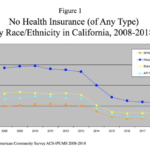
SANTA MARIA — On Sunday, March 30, the Santa Maria community peacefully rallied alongside farmworkers and allies, standing firm to demand dignity—not just for their labor but for their humanity. Everyone, no matter where they were born, deserves respect, fair wages, and the opportunity to live without fear.
“We are all here today united to use our voices to fight back against the deportations. We are fighting for our kids; we are fighting for ourselves because we are all essential and deserve the right to live safely, without fear,” said Gabriela Vivar, Farmworker Leader with Alianza Campesina.







